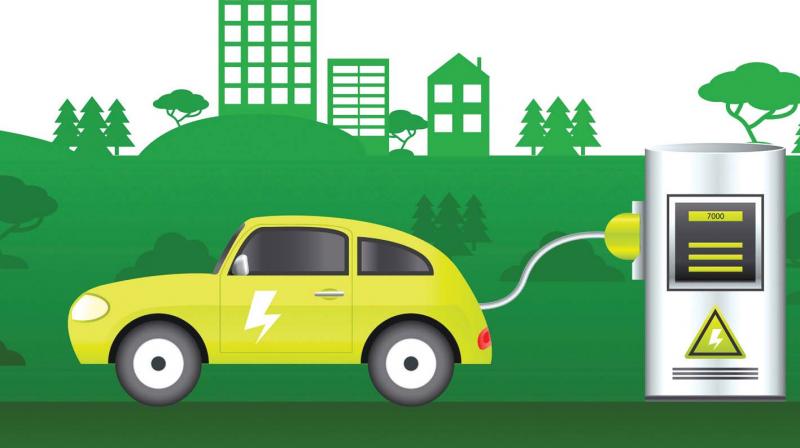Amp'le reasons to go electric, Bengaluru
There are already some 6000 electric vehicles in the city.

Air pollution is a growing concern and Bengaluru is determined not to follow in the footsteps of the capital city. BMTC is on its way to adding electric vehcles to its fleet - a welcome move. BESCOM is likely to add 11 additional charging points across the city, plans are underway to provide charging points along the Bengaluru-Mysuru highway, too. Uninterrupted supply and the availability of charging stations are priorities but it’s time also for renewed focus on non-motorised forms of transport and the infrastructure (pavements and cycling lanes) required to sustain them. Aksheev Thakur reports
In 2018, the Karnataka State Pollution Control Board (KSPCB) recommended that BMTC switch to CNG buses. They could not sway the corporation, however, which had its sights set on electric vehicles.
The recommendation was in a proposal made to the BMTC, says former KSPCB Chairman Lakshman. “The BMTC is going ahead with their plans of electric buses and we are fine with it. EVs are the future.”
The Bangalore Electricity Supply Company Limited (BESCOM) is already putting this into action, with plans of setting up 11 additional charging stations across the city. With air pollution becoming a growing concern for citizens and government agencies alike, the time is right to shift to electric vehicles. There are already some 6000 electric vehicles in the city.
Dr Lakshmikanth HM, a member of the Awareness Committee says, “I welcome the government’s initiative to move to electric vehicles. The increased use of EVs will certainly reduce air pollution and the government should make it compulsory, especially for smaller vehicles that carry one or two persons.” Another important consideration, he says, is that it will also greatly reduce noise pollution.
An official from BESCOM says that facilities for charging vehicles will also be extended to shopping malls, BDA and IT parks. The Karnataka Electricity Regulatory Commission (KERC) fixed the rate at Rs 4.85 per unit kWh. The electricity supply company has also planned charging stations that will be placed at 25 kilometre intervals on the Bengaluru-Mysuru highway.
Entrepreneur Dr Sreelekha suggests that since cabs have flooded city roads, the government should make it mandatory for the cab aggregators to ply only electric vehicles on city roads. “Cabs tend to carry one or two passengers only at any time but the vehicles do occupy space on the roads. We should not let the city turn into another rDelhi. If we have strict policies towards clean energy, we can do a lot,” she says.
Companies, research centres keen to partner with govt
Enzen Research Centre (ERC) has set up its corporate office in the city in September 2018 to develop niche technologies and solutions for electric vehicles, energy storage and affordable water treatment technologies.
The centre serves as an innovation and collaboration hub and develops cutting-edge technology and solutions with the aim of future-proofing energy and water space. Apart from nurturing talent within the organisation, it also collaborates with start-ups, academia, research institutes, think tanks and other stakeholders from across the globe to co-create solutions that solve tomorrow’s problems today.
Dr Uma Rajarathnam, head of Enzen’s Applied Research and Collaboration (ARC), said, “The centre brings together ideas, solutions, technology as well as the best minds to address the emerging needs of our focus sectors. It also develops products and solutions within the areas of electric vehicles, energy storage and water resource management, leveraging the potential offered by the internet of things (IoT), artificial intelligence (AI), robotics and mixed realities.”
The centre has already signed up with various programmes run by universities in the UK and Australia to develop solutions for the energy and water sectors. Among these programmes are Artificial Intelligence and Innovative Networks (AIIN) at Warwick University, as well as the Supergen Energy Network hub at Newcastle University.
The first batch of the researchers has been on-boarded at the centre. “We expect to bring in another batch over the next 3-4 months as a result of our ongoing Enzen Sustainability Challenge which serves as an open innovation platform for researchers, start-ups, universities, academic institutes, organisations, professionals and students to showcase their ideas and solutions. These researchers, together with Enzen’s experts, will co-create solutions that bridge the energy gap and bring energy and water to all in a sustainable manner,” she said.
She pointed out that ERC will be keen to collaborate with the state government on electric vehicles and water treatment plants.
“Both the government and Enzen are committed towards providing energy and water equity and accelerating social inclusion within the state. Our global experience, as well as advanced technology and models, coupled with the government’s knowledge of the local environment, can help us co-create the solutions for the state and achieve our shared goals,” she said.

